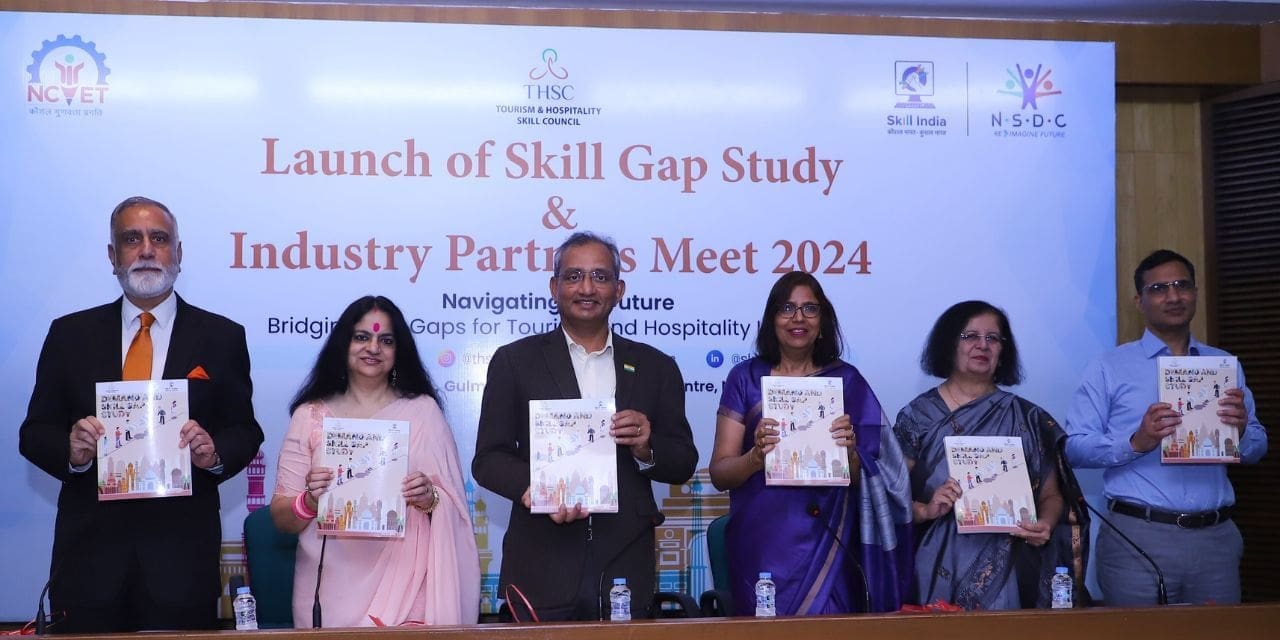New Delhi, India – March 22, 2024: The Tourism & Hospitality Skill Sector Council (THSC) has launched its highly anticipated report on the Demand And Skill Gap, alongside the Annual Industry Partners Meet. The Annual Industry Partners Meet 2024 was conducted under the theme of “Navigating the Future: Bridging Skill Gaps for the Tourism and Hospitality Industry.” This launch event, in collaboration with industry partners, took place at the Gulmohar Hall, India Habitat Centre, New Delhi, drawing stakeholders from across the nation.
The Skill Gap Report was officially unveiled by Mr. Atul Kumar, Secretary, of the Ministry of Skill Development and Entrepreneurship, in the presence of esteemed dignitaries representing the National Skill Development Corporation and Industry.
In an era marked by rapid globalization and evolving consumer demands, the tourism and hospitality sectors stand at a critical juncture. India’s tourism and hospitality sector has demonstrated resilience following the COVID-19 pandemic and is poised for further growth. It currently contributes 7.5% to India’s GDP, amounting to US$3420 billion, making it a significant contributor within the services sector. In 2022, the industry employed 39 million people, equivalent to 8% of India’s total employment, with US$22 million in forex earnings from January to October 2023 and 1.7 billion domestic tourist visits within India in 2023.
Recognizing the pivotal role played by skilled professionals in upholding the ongoing economic vitality, the Tourism and Hospitality Sector Skill Council has embarked on an expansive nationwide research endeavor.
A demand and skill gap study was deemed necessary due to evolving consumer preferences, government focus on niche sectors, and advancements in technology. The study aimed to address changing customer preferences such as adventure tourism, eco/sustainable tourism, wellness and medical tourism, and entrepreneurial aspirations. Additionally, it considered the government’s emphasis on niche sub-sectors like cruise tourism, rural tourism, and religious tourism, along with the impact of advancing technologies such as big data, artificial intelligence, and automation.
Mr. Rajan Bahadur, CEO of the Tourism and Hospitality Skill Council, stated, “We aim to develop and deliver educational programs focusing on practical skills to empower young individuals to excel in the global hospitality industry. Our commitment extends beyond mere training; we aspire to cultivate a workforce equipped not only with technical expertise but also with the adaptability and creativity necessary to thrive in an ever-evolving landscape. With a vision to bridge the existing skill gaps, our efforts are geared towards fostering a culture of continuous learning and innovation within the sector, ensuring its sustained growth and competitiveness on the global stage.”
At the Ministry of Skill Development and Entrepreneurship, we acknowledge the pivotal role of the tourism sector in the ‘Viksit Bharat’ initiative. Recognizing its significance for GDP growth and overall national development, we are committed to fostering both domestic and foreign tourism. To achieve this, collaboration with the Ministry of Tourism, NSDC, and NCVET is imperative. We must reimagine our approach, starting with integrating tourism education into the school curriculum and offering industry-aligned degree courses. Our efforts also extend to bridging skill gaps through comprehensive sector-wide studies. Together, we aim to elevate India’s tourism appeal and promote a skilled workforce, ultimately contributing to the nation’s prosperity.” – said Mr. Atul Kumar Tiwari, Secretary, of the Ministry of Skill Development and Entrepreneurship.
The study employed a multi-stage stratified random sampling approach, identifying 121 districts across 20 states and 6 union territories, focusing on prominent tourism circuits. The sample included 553 employers and over 10,000 youth, across various demographics.
Key findings indicated that 51% of surveyed youth preferred working in hotels, 31% in tours & travels, and the remainder in facility management. Some youths from specific states expressed interest in relocating for better job prospects. Additionally, there was a notable interest in gig work among youth, but concerns were raised regarding its lack of structure and limited career advancement opportunities.
Employers highlighted the need for skills such as problem-solving, communication, literacy, and team management, with one-third providing training facilities. However, cost constraints and high employee attrition hindered training efforts. The industry’s technological adoption was low, but there was an intention to increase it, particularly in digital reservation and payment technologies.
Emerging jobs identified include chef entrepreneurs, airline hospitality, and tech-friendly tour guides, with emerging skills such as data analysis, revenue management, and socio-emotional skills.
The study estimated that 5.7 million youth could be trained to meet an expected incremental labor demand of 3 million workers between 2025 and 2028. However, challenges such as low wages and long working hours deterred youth from continuing in the industry.
The Skill Gap report launch was followed by an Industry Partner meeting which revolved around “Navigating the Future: Bridging Skill Gaps for the Tourism and Hospitality Industry.” The agenda encompassed a series of pertinent discussions and presentations aimed at addressing key challenges and opportunities within the sector. Scheduled sessions include insightful presentations on the implementation of the Direct Benefit Transfer (DBT) framework under the National Apprenticeship Promotion Scheme (NAPS), a panel discussion focusing on the multifaceted challenges and issues encountered by the industry, particularly concerning the demand-supply gap and the efficacy of the Recruit, Train, and Deploy model, as well as deliberations on the Recognition of Prior Learning (RPL) and the significance of Corporate Social Responsibility (CSR).
Concluding on a celebratory note, the event culminated with the presentation of awards to industry partners who demonstrated exceptional commitment and effectiveness in fostering the skilling of youth within the sector.

